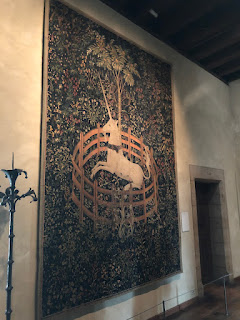Bloomsburg University’s 4th annual College of Liberal Arts Symposium was held just last week, inviting professors and alumni to speak and share their experiences and knowledge at various panels. One such panel featured five alumni of the English Department, providing life experience to English majors who are all going to be wondering the same thing upon graduation:
what happens next?
  |
| From left: Steve Kotch, Lisa Regan, Jennifer Melzer, Seth Nolan, Keara Hozella |
Keara Hozella (’14) is a Corporate Storyteller at SEKISUI SPI, a plastics manufacturing company in Bloomsburg. What does a corporate storyteller do? Hozella does all of the company writing, including social media, press releases, internal communications and editing. Whew.
Biggest piece of advice? Be involved at Bloom outside of classes. Hozella was a Gender Studies minor as well as an English major. SHe was also involved with the Voice (our student newspaper), the writing center (now WALES), and was gender studies work study student. All of these extracurricular activities helped her to gain skills that she uses in her job today.
Her interviews that she did with the Voice helped her to learn how to interview her coworkers and colleagues. Her English classes taught her how to write, write well, and edit well—and importantly, how to edit others without offending them.
Words of wisdom: “Your plan that you have right now might shift, but there are always ways for you to get to where you want to be.”
Steve Kotch (’10) is currently a copywriter at web.com, and is working on his teaching degree. He started out in the education track, but decided to go the full English major route when he found he wanted to write more. After completing his undergrad, he took a job at the call center of web.com, and after working there a little, noticed that they had copywriters and copyeditors. He applied for that position, and is now a copywriter, writing and editing copy and helping businesses move up the ranks in Google.
Words of wisdom: (on applications) “They want to see that you’re interested in the craft.”
Jennifer Melzer (06’) is a freelance author and editor. She’s been editing since right after she graduated, after hearing the advice from those around her saying that she had to focus to do something with her degree. Meltzer scoured the internet and created contacts that helped her build her client list and has been editing and writing fiction for the last 12-13 years.
The skills Meltzer uses most as an editor are her peer review skills she honed from her English classes, and how to give feedback without being hateful or hard. It all boils down to tact.
Words of wisdom: “I just started looking all over the place for places to write for, and through those opportunities I met other writers, and most of them were fiction writer or business writers and they needed an editor.”
Seth Nolan (’15) is currently a newspaper journalist at the Williamsport Sun Gazette, a “medium-to-small sized city with big city problems” that covers the news daily. Nolan has been a reporter there for three years, after a stint with the Press Enterprise, and is now an editor, in addition to helping with media and design.
Nolan learned how to be a diverse writer at Bloom. At the paper, he’s been required to cover all sorts of stories, from crime and court, to environmental issues, to whatever else they’d throw at him. It all requires him to be in a different headspace, and his experiences with English helped him to cover these stories.
Words of wisdom: “I was always more on the creative end, even though I was on the literature track. I realized I needed to get a portfolio together and got involved with the Voice. I started a little late, but it’s not too late to start building a portfolio . . . I’d got together a solid portfolio and send it to different editors, saying ‘this is my experience.’"

Lisa Regan (’02, ’05) currently is a full-time writer. Her titles have been on the USA Today and Wall Street Journal bestseller lists.
After first graduating from BloomU, Regan wasn’t sure of what she wanted to do, so she decided she wanted to get her PhD and become a professor. She came right back for her masters, and upon student teaching, realized that she didn’t share the same passion for teaching that her colleagues did. She finished her masters and went to Philadelphia to start working on writing, becoming a paralegal to pay the rent. She worked for thirteen years as a paralegal before she could start writing full time. She currently has eleven titles published, with her twelfth coming out in December.
There are three skills she gained as an English major that helped her with both her paralegal work and her writing, she says, and will carry over to any field. The first is critical thinking. The second, attention to detail. And the third, spelling and grammar.
Words of wisdom: “NOBODY uses critical thinking in the real world. I was a very highly paid paralegal. I was a plaintiff’s paralegal, which normally doesn’t pay much, but my boss valued my critical thinking skills so highly that I made twice as much as the others.”

While all of the alumni on the panel had great advice for the students in the crowd, one of the best pieces of advice came from Dr. Entzminger, the English Department head, while closing the panel: “Not everybody’s job is the right job.” None of these panelists started in the job the ended up in, and a few of them might move on to different jobs in the future, but the skills they learned as English majors with carry with them throughout their lives and help them in their careers.






















